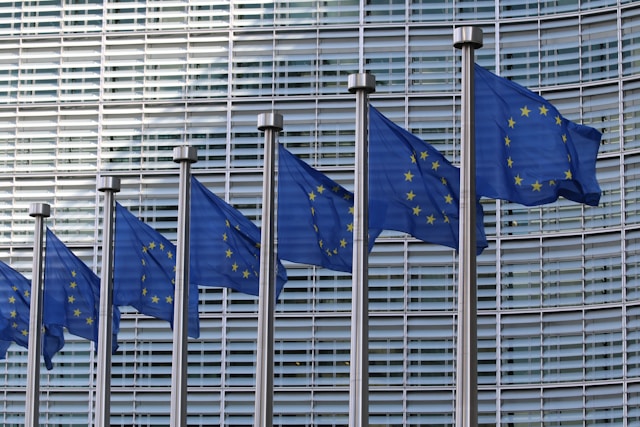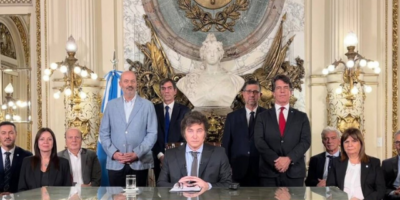Check out the latest news on laws and regulations.

Will Argentina Benefit from a Free Trade Agreement with the EU?
The local media have been widely reporting an imminent free trade agreement (“FTA”) between Mercosur (a customs union composed of Argentina, Brazil, Paraguay and Uruguay) and the European Union. Nonetheless, details have been sketchy and inconsistent. Special thanks to Satine Berton, 2025 intern and current candidate for a law degree at L’École de Droit de Sciences Po Paris (France), for her help in preparing this article.
First, Some Context
In December 2024, the EU and Mercosur signed an FTA. This represented a culmination of negotiations begun in the late 1990s. A June 2019 “agreement in principle” was widely touted by Argentina’s president (Mauricio Macri) as a harbinger of increased trade between the two regional blocs. As the agreement was non-binding and a mere expression of intent without specifics, the pronouncement proved premature.
The EU subsequently halted further progress on an FTA in response to Brazil’s domestic policies under the Bolsonaro administration, most notably those that would increase deforestation of the Amazon region. Talks stalled until December 2023, when Brazil (now under President da Silva and enhanced environmental protection) enabled a pathway to a binding agreement. To meet EU environmental concerns, the Mercosur members agreed to an express commitment to the 2015 Paris Climate Agreement. For Ursula von der Leyen, President of the European Commission, obtaining this FTA was a priority, given its significant economic and strategic implications [1].
Key Terms of the FTA
The FTA reduces trade barriers for the member states represented by the two trading blocs [2]. The EU would eliminate or remove tariffs on 92% of Mercosur exports, while Mercosur would remove duties on 91% of imports from the EU. Once ratified by the member states, the FTA is expected to stimulate goods and services for over 700 million consumers, potentially adding 0.1% growth to the EU economy by 2032, and 0.3% growth to the Mercosur economy [3].
The FTA also introduces specific trade quotas, such as allowing 99,000 metric tons of beef per year to enter Europe at a reduced 7.5% tariff rate. In return, Mercosur will gradually phase out customs duties on key European exports, including cars, machinery, wine, and cocoa. Additionally, the FTA mandates recognition of 350 EU geographical domains used to confer product uniqueness in quality or reputation, preserving value and protecting against misleading or false labeling of these European products.
In addition to eliminating tariff barriers, the FTA includes provisions to open public procurement markets to private sector businesses from both blocs, allowing them to compete for government contracts in a fair and transparent manner. It also establishes a dispute settlement mechanism to challenge rules or actions that undermine intended trade benefits and to enforce intellectual property rights. Faithful to the reboot following Brazil’s policy shift, the FTA includes various environmental provisions to align with the Paris Climate Agreement, which had hindered negotiations previously. Finally, the FTA allows members of both blocs to temporarily restrict imports if a member state deems it necessary to address grave local economy issues.
Argentina and the FTA
For Argentina, specifically, the FTA offers an opportunity to increase significantly its trade volume with the EU [4]. The Milei Administration foresees the FTA providing a trade stimulus in sectors in which Argentina holds a competitive advantage (e.g. agribusiness and commodities). Citrus fruits, vegetables, and cotton will specifically benefit from tariff reductions phased in over the next four to ten years. Tariffs on Argentine wines will be gradually eliminated over an eight-year period.
Due to its lack of competitiveness, the Argentine manufacturing base does not stand to similarly benefit from the FTA. Various protected sectors (e.g. textiles) fear the impact on their businesses.
Implementing the FTA
Before taking effect, the FTA must be translated into the EU’s 24 official languages and finalize certain legal procedures. For Mercosur member states, the FTA must be approved by national legislatures, but without requiring unanimity. Even if some countries fail to ratify it, the FTA will apply to those that do.
On the EU side, the FTA must be submitted to the Council of the EU for approval by a majority vote of its member states. This means the FTA must secure approval by at least 15 out of 27 votes (55%) from countries representing at least 65% of the EU’s total population. Nonetheless, the EU’s adoption of the FTA is far from certain. France,
Poland, Italy, Belgium, the Netherlands, and Austria have each anticipated an intent to vote against the FTA in the Council vote.
Opposition to the FTA
The opposition of these European countries is rooted in concerns over the impact on their own agricultural sectors, the likelihood of unfair competition, environmental risks, and vastly different regulatory standards between the two blocs. Critics of the FTA point to the regulatory disparity as likely to render extremely difficult compliance and rule enforcement against the member states [5].
Political dynamics also play a key role. Right-wing conservative parties generally oppose the FTA, and with the rising influence of far-right parties in Europe opposition is likely to increase. Resistance is not solely political, as groups representing various ideologies or interests oppose the FTA for diverse reasons. Mounting opposition appears to be making approval of the FTA increasingly uncertain.
Additional Challenges to Reaching Consensus on the FTA
Discussions and approval at the Council level may take years (there is no statutory term for approval). If approved by the Council, the FTA will then require validation by a majority vote of the European Parliament. National parliaments may also be required to vote on some or all of the FTA, depending on its classification by the European Commission. If treated as a ‘mixed’ agreement, its non-commercial provisions would likely require individual member state parliamentary approval. If, however, the Commission “splits” the commercial terms from the rest of the FTA, as with the EU-Canada (CETA) treaty, the FTA could enter into effect without individual member state approval.
Mercosur offers similar challenges to reaching a consensus. Paraguayan President, Santiago Peña, has expressed reservations emphasizing that any trade deal must align strictly with Mercosur’s internal framework and not undermine the bloc’s cohesion. In contrast, Brazil’s President, Lula da Silva, has openly and strongly supported the FTA, citing its economic and geopolitical benefits. Meanwhile, Uruguay, which has long pushed for greater trade flexibility within Mercosur, views the deal as a positive step but remains frustrated with the bloc’s slow progress in securing international agreements.
The Immediate Future for Argentina
The EU-Mercosur FTA marks a significant step toward deepening economic ties between both regions. While promising substantial benefits, its approval remains uncertain due to staunch opposition by several EU countries. Whether the FTA will become a reality—and in what form—will likely depend on the EU’s internal politics over the next few months. In the meantime, the Milei Administration is unlikely to sit idly and will continue efforts to negotiate bilateral FTAs with the U.S. and other countries, even if that means building treaty relationships outside the Mercosur framework.
Footnotes
[1] Despite President von der Leyen’s satisfaction, many European stakeholders continue to assert that the FTA with Mercosur remains incompatible with the Paris Climate Agreement standards.
[2] The FTA excludes Bolivia (a Mercosur member state since July 2024). Bolivia has four years to align with the Mercosur treaties and regulations before it can ratify the EU-Mercosur FTA.
[3] Olivier, A., Verdes, J., and Lequeux, V. (2024, December 16). Commerce: qu’est-ce que l’accord de libre-échange entre le Mercosur et l’Union européenne? (What is the Free Trade Agreement between Mercosur and the European Union?). Touteleurope.eu. https://www.touteleurope.eu/economie-et-social/commerce-qu-est-ce-que-l-accord-de-libre-echange-entre-le-mercosur-et-l-union-europeenne/.
[4] According to Gustavo Scarpetta, University lecturer at the National University of Córdoba (UNC) and the Catholic University of Córdoba (UCC), Argentina’s current trade volume (exports and imports) with the FTA could triple. Scarpetta, G. Cuáles serán los impactos para Argentina de un acuerdo Mercosur y la Unión Europea (What Will be the Impact on Argentina of a Mercosur-European Union Agreement?). Universidad Católica de Córdoba. (December 15, 2024) https://www.ucc.edu.ar/notas/cuales-impactos-argentina-acuerdo-mercosur-union-europea/.
[5] French farmers critical of the FTA claim they face unfair competition from larger South American farms operating under weaker environmental and health regulations and with lower labor costs. They and others in the agricultural sector further warn of the daunting challenges faced by member states to monitor product quality of agricultural imports necessary to ensure compliance with EU standards. France 24. (2024, November 14). Pourquoi les agriculteurs français se mobilisent de nouveau contre un accord avec le Mercosur? (Why are French farmers mobilizing again against a deal with Mercosur?). https://www.france24.com/fr/france/20241114-pourquoi-les-agriculteurs-fran%C3%A7ais-se-mobilisent-de-nouveau-contre-un-accord-avec-le-mercosur.
More information
If you would like to discuss this matter with the attorneys at Wiener Soto Caparros, please do not hesitate to contact our authors.
Disclaimer
This article is based on publicly available information and is for informational purposes only. It is not intended to provide legal advice or an exhaustive analysis of the issues it mentions.





